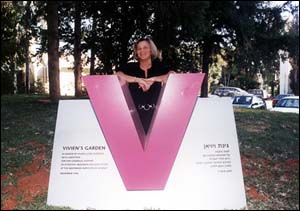
Vivien Clore Duffield
Q: Can you remember the first time you came to the Weizmann Institute?
A: Yes. I was 11. My father took me and my brother. It was our first trip to Israel and we were met -- I'll never forget it -- on the tarmac by this amazing biblical figure with white flowing hair. It was Meyer Weisgal (Ed: Chaim Weizmann's close associate and the driving force behind the Weizmann Institute's early development). He was an amazing man.
In a funny way the Institute felt like a second home. In those days it was quite a thing to get to Israel from the United Kingdom. You flew by a good old Viscount plane, which involved stopping off in Rome, Athens and Cyprus. It would take forever to get there. We would go for two to three weeks every Passover. We had a house then on campus, then eventually a flat, above the students' housing. (Ed: The Charles Clore International House). I gave the flat back to the Institute recently for conversion into additional student housing.
Q: And then your daughter Arabella became involved with the Institute?
A: Yes, but in a totally different way. Arabella spent a summer on campus at the annual Dr. Bessie F. Lawrence International Summer Science Institute for promising young scientists.
Q: Having known the Institute since childhood, how do you feel about the way it's developing?
A: Well, it's less changed than the rest of Israel. It still has its greenery and recognizable places. Every time I come, something else happened. Yet, with all the new developments, there's still a sense of history. I don't think you need a historical perspective to do science; but science at Weizmann is probably enhanced by the fact that it is one of the oldest scientific institutions in the region, with a firm reputation and a history of excellence. Israel's first President (Ed: Dr. Chaim Weizmann) lived on campus, and his home -- which we helped to restore -- is beautiful.
Q: You have now become a Deputy Chairperson of the Board of Governors. Do you have any particular aims for your time in office?
A: I have absolutely no aims at all, apart from being of some use. I tend to agree totally with the Chairman of the Board (Ed: Gershon Kekst, U.S.), that the Board's main function, apart from disseminating information about the Institute and bringing in new people, is to raise and give money. I maintain that about all the boards on which I serve. That doesn't make me particularly popular. But I can also see the board as a vehicle for bringing people together, for creating a certain social ambiance and a sense of a common purpose, which is good.
Q: You recently provided generous funding for the expansion and upscalling of the Youth Activities Section's Garden of Science. Why did you choose this particular aspect of the Institute's work?
A: I think it's paramount. Science in Israel will not survive unless science education keeps up with the rest of the world or, in fact, is in the vanguard.
Q: What are your hopes for the Institute?
A: I would like to see more students from the neighboring countries. It isn't happening yet, but it might. I'd also like to see a Nobel prize; that really would be wonderful. I'd like to see one of our discoveries bringing in enough money so we don't have to scrape around quite so much for funds, and I would like to see continued excellence at the top, as we have with the current President, Prof. Haim Harari. We're going through a golden age at the moment and it would be nice to keep it going. The campus is wonderful. There has been a tremendous amount of new activity and new building that lives up to what Meyer Weisgal and Chaim Weizmann wanted: excellent science in beautiful surroundings. And they are beautiful.
